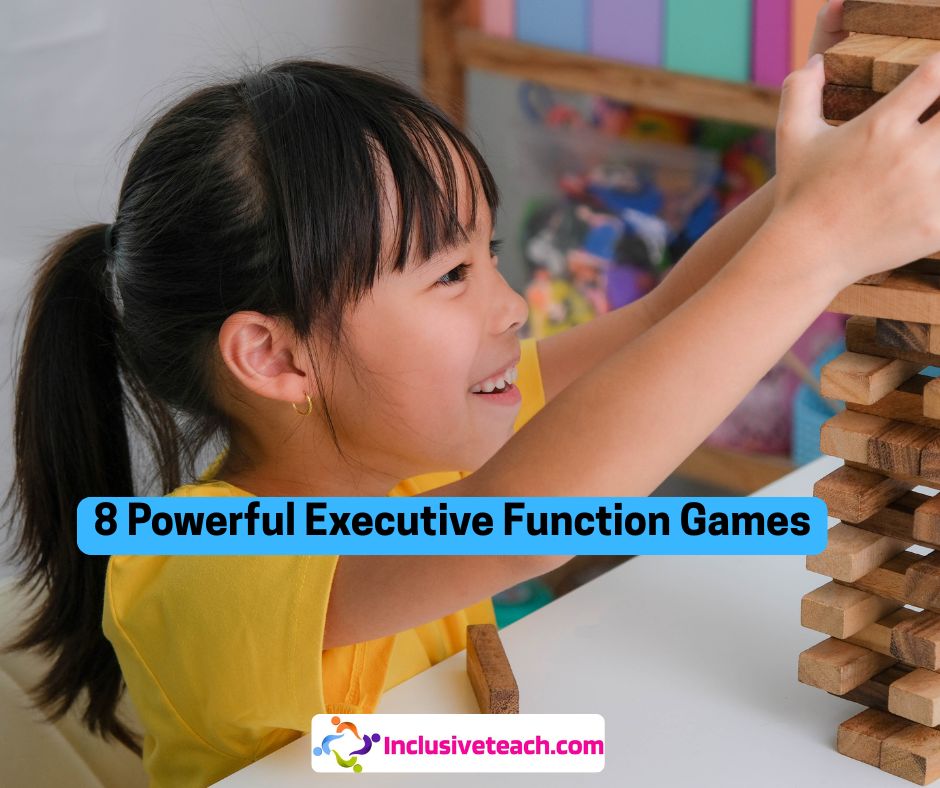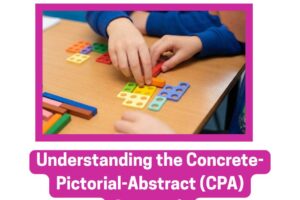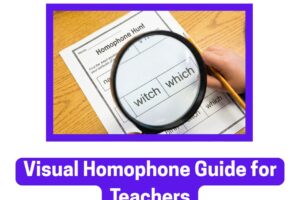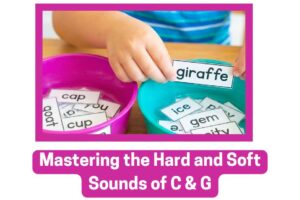
8 Powerful Executive Function Games
Executive function skills are the invisible superpowers that help students succeed, not just academically, but in life. These cognitive abilities include planning, focus, flexibility, self-control, and working memory. The challenge? Traditional teaching methods often struggle to develop these crucial skills effectively.
The solution is simpler than you think: games.
You don’t need expensive technology or specialized programs. The most effective executive function training tools are probably already in your classroom closet. Research consistently shows that well-chosen games can significantly improve students’ cognitive abilities while keeping them engaged and motivated.
Ready to discover how eight classic games can revolutionize your teaching approach?

Why Games Are Executive Function Powerhouses
Before exploring specific games, it’s important to understand why this approach works so well. Games naturally create the perfect conditions for executive function development:
- Low-stakes practice environment where mistakes become learning opportunities
- Immediate feedback that helps students adjust their strategies
- Intrinsic motivation that keeps students engaged longer than traditional exercises
- Social interaction that builds collaborative problem-solving skills
- Repeated practice disguised as fun, making skill-building sustainable
8 Easy Executive Function Games
1. Scrabble: The Strategic Word Builder
Target Skills: Planning, organization, working memory
Scrabble transforms vocabulary practice into strategic thinking bootcamp. Students must hold multiple letters in working memory while planning their next move and organizing their approach to maximize points.
Classroom Implementation:
- Create themed Scrabble centers tied to current units (science terms, historical vocabulary, literature characters)
- Use collaborative word mapping where teams work together to build interconnected words
- Implement “planning pause” moments where students must explain their strategy before placing tiles
Differentiation Tips:
- Provide picture-supported letter tiles for visual learners
- Allow dictionary consultation for English language learners
- Create smaller boards or shorter time limits for students who feel overwhelmed
2. Blurt!: The Impulse Control Champion
Target Skills: Self-control, verbal expression, attention
This fast-paced game teaches the art of restraint, students must process clues quickly but wait for their turn to respond. It’s perfect for developing the “pause and think” skill that’s crucial in classroom discussions.
Classroom Implementation:
- Use subject-specific clues to reinforce content learning
- Establish clear visual cues for turn-taking (hand signals, timer displays)
- Incorporate reflection discussions about waiting strategies
Differentiation Tips:
- Provide think-time cards for students who need processing support
- Allow whispered consultations for collaborative support
- Use gesture-based responses for non-verbal learners
3. Freeze Dance: The Attention Anchor
Target Skills: Self-control, attention regulation, body awareness
Don’t underestimate the power of this simple game. Freeze dance develops the crucial ability to stop impulsive movements and redirect attention on command, skills that transfer directly to classroom behavior management.
Classroom Implementation:
- Use during transitions to reset attention and energy
- Add academic elements: freeze in shapes that represent math concepts or historical poses
- Create “mindful freeze” moments where students notice their thoughts and feelings
Differentiation Tips:
- Provide movement options for students with physical limitations
- Use visual cues alongside auditory signals
- Allow “soft freezes” for students working on impulse control
4. Jenga: The Precision Planner
Target Skills: Self-control, planning, fine motor coordination
Jenga’s inherent tension creates the perfect environment for developing careful planning and emotional regulation. Every move requires students to consider consequences and manage their impulses. We’ve gone for an image of giant jenga, which is higher risk because it hurts when it falls on you!
Classroom Implementation:
- Add academic challenges: answer a question before each move
- Use as a metaphor for teamwork and individual responsibility
- Create reflection opportunities about planning strategies
Differentiation Tips:
- Use larger blocks for students with fine motor challenges
- Allow team consultations for decision-making support
- Provide stress-reduction techniques for anxious players
5. Pictionary: The Flexible Communicator
Target Skills: Cognitive flexibility, time management, creative problem-solving
When words fail, pictures must succeed. Pictionary forces students to shift between different thinking modes while managing time pressure—perfect for developing mental flexibility.
Classroom Implementation:
- Create subject-specific card decks (scientific processes, literary themes, historical events)
- Use timers to build time-awareness skills
- Facilitate discussions about adaptation strategies when drawings don’t work
Differentiation Tips:
- Allow verbal hints for students with drawing difficulties
- Provide category clues to scaffold thinking
- Use collaborative drawing for fine motor support
6. Jigsaw Puzzles: The Persistence Builder
Target Skills: Perseverance, working memory, visual-spatial processing
Puzzles are patience teachers disguised as entertainment. They require students to hold mental images while systematically working toward a goal—fundamental skills for academic success.
Classroom Implementation:
- Choose curriculum-connected images (historical maps, scientific diagrams, artwork)
- Use as calm-down activities during overstimulating days
- Create puzzle partnerships that encourage collaborative problem-solving
Differentiation Tips:
- Provide edge pieces as starting support
- Use puzzles with varying complexity levels
- Allow extended time for completion without pressure
Target Skills: Cognitive flexibility, perseverance, creative problem-solving
Brain teasers force students to abandon obvious approaches and explore creative solutions. They’re perfect for developing the mental agility needed in complex problem-solving situations.
Classroom Implementation:
- Use as morning warm-ups or transition activities
- Create subject-specific riddles and logic puzzles
- Encourage group brainstorming to build collaborative thinking
Differentiation Tips:
- Provide hint cards for struggling students
- Allow extended processing time
- Offer multiple difficulty levels simultaneously
8. Chess: The Ultimate Strategic Thinker
Target Skills: Planning, working memory, strategic thinking
Chess is the gold standard of executive function games. It requires players to remember rules, anticipate consequences, and plan multiple moves ahead—all while adapting to an opponent’s strategy.
Classroom Implementation:
- Start with simplified versions focusing on one piece type
- Use visual aids showing possible moves
- Create post-game reflection discussions about strategy and decision-making
Differentiation Tips:
- Begin with checkers or simplified chess variants
- Provide move-suggestion cards for beginners
- Allow team consultations during learning phases
Maximizing Your Game-Based Teaching
Integration Strategies
Daily Integration:
- Designate 10-minute “Brain Game” slots during transitions
- Use games as reward choices rather than mandated activities
- Create game rotation stations during independent work time
Weekly Structure:
- Implement “Game Wednesday” as a consistent classroom tradition
- Rotate featured games monthly to maintain novelty
- Connect games to upcoming curriculum units for relevance
Creating an Inclusive Game Environment
Physical Adaptations:
- Ensure wheelchair accessibility for all game areas
- Provide adaptive equipment for fine motor challenges
- Create quiet spaces for overstimulated students
Cognitive Adaptations:
- Offer simplified rules without reducing engagement
- Provide visual instruction cards alongside verbal directions
- Allow flexible timing based on individual processing needs
Social-Emotional Support:
- Teach explicit strategies for managing frustration
- Model good sportsmanship and resilience
- Create opportunities for peer mentoring and support
The Science Behind the Strategy
Research from cognitive psychology and educational neuroscience supports game-based executive function training. Studies show that students who regularly engage in strategic games demonstrate:
- 15-20% improvement in planning and organization skills
- Enhanced working memory capacity equivalent to 6-8 months of additional development
- Better emotional regulation during challenging academic tasks
- Increased intrinsic motivation for learning activities
The key is consistency and intentional implementation rather than random game playing.
Making It Sustainable
Start Small
Begin with 2-3 games you feel confident facilitating. Master these before expanding your game library. Quality implementation trumps quantity every time.
Adapt and Evolve
Pay attention to what works for your specific students. Successful game-based teaching requires ongoing observation and adjustment based on student response and engagement levels.
Beyond the Classroom
The executive function skills developed through these games extend far beyond academic success. Students develop:
- Life management skills for organizing homework, chores, and responsibilities
- Social competencies for navigating friendships and group dynamics
- Emotional regulation abilities for handling stress and disappointment
- Problem-solving confidence for tackling unfamiliar challenges
Your Next Steps
- Choose one game from this list that excites you and aligns with your current curriculum
- Plan a trial week with clear objectives for what you want to observe
- Gather simple materials needed for implementation
- Start with short sessions (10-15 minutes) to build positive associations
- Document what works and what needs adjustment for your specific students
Remember, the goal isn’t to become a game expert overnight. It’s to harness the natural power of play to develop the cognitive skills your students need for lifelong success.
The Bottom Line
Executive function skills are too important to leave to chance, and too complex to develop through worksheets alone. Games provide the perfect combination of engagement, repetition, and challenge that makes real skill development possible.
Your students don’t need to know they’re doing “brain training”—they just need to experience the joy of strategic thinking, the satisfaction of perseverance, and the confidence that comes from developing genuine cognitive abilities.
So dust off those game boxes, clear some floor space, and prepare to watch your students develop the mental superpowers they need to succeed. Your classroom is about to become a whole lot more effective—and a whole lot more fun.
Ready to share your success stories? Connect with other educators implementing game-based executive function training and discover new adaptations that work for diverse learners. Together, we’re building stronger minds, one game at a time.

Related
Discover more from Special Education and Inclusive Learning
Subscribe to get the latest posts sent to your email.
Source link




